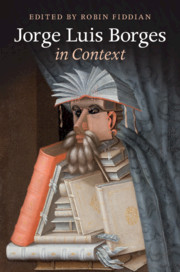Book contents
- Jorge Luis Borges in Context
- Jorge Luis Borges in Context
- Copyright page
- Contents
- Illustrations
- Contributors
- Acknowledgements
- Permissions
- Note on Primary Sources and Editions Used
- Chronology
- Note on Translations and Abbreviations
- Introduction Borges in Context, Context in Borges
- Part I Self, Family, and the Argentine Nation
- Part II The Western Canon, the East, Contexts of Reception
- Chapter 17 Borges and Cervantes
- Chapter 18 Borges’s Shakespeare
- Chapter 19 Borges and the Dialectics of Idealism
- Chapter 20 The English Romantics and Borges
- Chapter 21 Borges and the First Spanish Avant-Garde
- Chapter 22 Borges and James Joyce: Makers of Labyrinths
- Chapter 23 Borges and Kafka
- Chapter 24 Borges and the Bible
- Chapter 25 Borges and Judaism
- Chapter 26 Borges and Buddhism
- Chapter 27 Borges and Persian Literature
- Chapter 28 Borges and the ‘Boom’
- Chapter 29 Argentina and Cuba: The Politics of Reception
- Chapter 30 Borges and Coetzee
- Chapter 31 Borges in Portugal
- Chapter 32 Borges and Italy
- Further Reading
- Index
Chapter 25 - Borges and Judaism
from Part II - The Western Canon, the East, Contexts of Reception
Published online by Cambridge University Press: 16 January 2020
- Jorge Luis Borges in Context
- Jorge Luis Borges in Context
- Copyright page
- Contents
- Illustrations
- Contributors
- Acknowledgements
- Permissions
- Note on Primary Sources and Editions Used
- Chronology
- Note on Translations and Abbreviations
- Introduction Borges in Context, Context in Borges
- Part I Self, Family, and the Argentine Nation
- Part II The Western Canon, the East, Contexts of Reception
- Chapter 17 Borges and Cervantes
- Chapter 18 Borges’s Shakespeare
- Chapter 19 Borges and the Dialectics of Idealism
- Chapter 20 The English Romantics and Borges
- Chapter 21 Borges and the First Spanish Avant-Garde
- Chapter 22 Borges and James Joyce: Makers of Labyrinths
- Chapter 23 Borges and Kafka
- Chapter 24 Borges and the Bible
- Chapter 25 Borges and Judaism
- Chapter 26 Borges and Buddhism
- Chapter 27 Borges and Persian Literature
- Chapter 28 Borges and the ‘Boom’
- Chapter 29 Argentina and Cuba: The Politics of Reception
- Chapter 30 Borges and Coetzee
- Chapter 31 Borges in Portugal
- Chapter 32 Borges and Italy
- Further Reading
- Index
Summary
Borges, who grew up bilingual, sought to fashion his cultural identity on multicultural lines, and his assimilation of Jewish themes must be seen as an attempt to find points of contact between Jewish and Argentinian experiences. Known for his references to the Aleph, the Kabbalah, and the Golem, Borges’s interest in Jewish culture must be understood as a training in alien metaphor, with the aim of creating aesthetic forms. The conception of a mobile language and textual structure leads to an appreciation of Borges’s stories as sites of opening and multiplicity, deriving their mobility from the damaged nature of signs. In his works Jewish topoi serve as ethical devices and wandering signifiers.
- Type
- Chapter
- Information
- Jorge Luis Borges in Context , pp. 204 - 210Publisher: Cambridge University PressPrint publication year: 2020

